Even if you don't have a musical background, you can set your child up for success in learning piano! As long as you help your child stick to a practice schedule and encourage them, you're already doing a lot. Let's explore some great ways to help your child make progress, stay inspired, and look forward to their lessons.

Practicing
Diligently stick to a practice schedule.
If your child does not practice the piano on a consistent basis, he will not be able to make progress. The best way to ensure consistent practicing is to set up a schedule and to stick to it. Even if he complains, make sure that he sticks to the schedule; his teacher will thank you!
Many kids practice in the morning before school, or immediately after school and before homework and extra-curricular activities. For older teenagers, it may be better for them to practice right before going to bed as long as that doesn't bother the rest of the family. Whatever time slot fits best into your schedule on a consistent basis (at least 4-5 days per week) is what you should be doing.
When choosing a time slot to practice, keep in mind when your child can focus the best. For example, if he tends to get antsy in the late afternoon, that means he should practice in the morning instead. Feel free to experiment with different times for the first week or so to see what is best for him.
Create a quiet, pleasant practice space.
Whether you have a digital or acoustic piano, it's important that your instrument be in a place with lots of natural light. Make sure that the practice area is free from distractions and is a pleasant space for your child to spend his time.
Don't force your child to practice for too long.
Playing the piano is a complex skill that requires a lot of concentration. Make sure that your child can sit still and focus for the whole length of their practice. You might need to split up his practice session into two or three shorter lengths depending upon his attention span.
For most young children (ages 5-7), the longest they can focus on practice is 10-15 minutes at a time--maybe even 5 minutes for energetic kids! Older children (ages 8-11) should be able to play for 20-30 minutes at a practice session. Children 12 years and older should be able to play 30-45 minutes at a time, and can eventually work up to 1 hour and 15 minutes of practice time.
Encourage your child every day.
No matter what skill level your child has, always make sure to say something positive about their playing. Learning piano is a challenge for anyone of any age, so hearing praise from their parents, older siblings, friends, neighbors, and their piano teacher is crucial to building their confidence. If you are struggling to think of something positive to say, here are some ideas.
- “Thank you for playing the piano for me today!”
- “You counted out loud the whole time. That's fantastic!”
- “Great job! You did everything that your teacher asked you to do!”
- “You did an awesome job fixing that mistake.”
- “I'm glad to hear that you played your song slowly today.”
- “I love hearing you play!”
- "You're making great progress!"
- "Keep up the great work, and you'll be able to master that hard part in no time!"
- "Thank you for practicing today even though you didn't feel like it."
As a parent, you want to make sure that your child has a love of music, not just skill at the keyboard. Help him see the value of practice while making it fun and approachable.

Use practice incentives.
Many piano teachers have a reward system where students can earn points for completing certain assignments during the week. If your teacher doesn't have an incentive program, start your own. Choose fun prizes or activities that your child can work towards by earning practice points.
Here are some prize ideas.
- Small Toys & Games (stuffed animals, mini board games, brain teasers)
- School/Art Supplies (special pencils, erasers, stickers, notebooks)
- Food (candy, ice cream or other desserts, meal from their favorite restaurant)
- Screen Time (playing video games or watching TV)
- Gift Cards (Amazon, iTunes)
- Tech Gadgets (Headphones)
- Concert Tickets (to attend with you or a relative)
Here are some ways your child can earn points, if you choose to set up your own family reward system. You can always talk to your piano teacher to see what is most important for your child to focus on for that week/month.
- Practicing the piano every day (5 days a week)
- Practicing technique at each practice session (scales, chords, arpeggios, etudes)
- Doing sight training every day (5 days a week)
- Practicing ear training every day (5 days a week)
- Completing written theory lessons every week
- Playing pieces five times each per practice session
- Mastering a song or technique
- Learning a certain number of pieces
- Completing a songbook or technique book
- Finishing a level or receiving a certificate
- Performing at a church service or a recital
- Showing consistent improvement in their playing
- Having enthusiasm or a good attitude for practicing
Add variety to your child's practice routine.
Is your child getting tired of sitting at the piano and not looking forward to his practicing? Incorporate some fun piano games and music apps into their practice routine to spice things up. If you're excited about your child learning piano and if you make it fun for him, he will pick up on that.

Theory & Technique
Make sure your child does "spot practice."
This means working on a small section of music (2-4 measures, depending upon the difficulty) at a time. Ask your child to play the right hand (treble clef) 5 times, the left hand (bass clef) 5 times, and then hands together (both clefs) 5 times. This process is a great way to break down a song and make it easier for him to learn.
Make sure your child learns the names of the notes and their value.
Use an app like NoteRush to help your child learn to quickly identify the notes on the treble and bass clefs. It's also vitally important that your child can learn the time value for each note (whole note, half note, quarter note, eighth note, etc.).
Even though the piano teacher teaches these skills at the lessons, it's up to you to reinforce this learning at home. Piano lessons are only a short period of time once a week, and your kid needs to be practicing these skills on a daily basis in order to master them. Learning the notes and their time values isn't quick and easy for most kids, so make sure to encourage them and hold them accountable along the way.
Make ear training interactive.
Especially if you don't know a lot about music, it can be difficult to help your child with his ear training practice. Fortunately, the Royal Conservatory of Music offers an affordable subscription to their online ear training. It's accessible from mobile phones, tablets, or desktop computers, and is easy for your child to use on their own.
For each level of piano (Prep A & B through Level 10), there are multiple types of ear training exercises that grade your child's progress and helps him develop his musical skills. Even if you're not using the Royal Conservatory piano curriculum, this online resource makes ear training quick, easy, and fun for piano students of all levels. It's also great for piano teachers to brush up on their own ear training.

Incorporate music theory into your child's practice routine.
For a successful musician, learning music theory is as important as learning ABCs and math facts. If your child doesn't know the basics of music theory, he will be severely hindered from learning any musical instrument quickly and easily.
Fortunately, it only takes a few minutes per day to study music theory, especially with the right curriculum. I really like the Royal Conservatory of Music's theory curriculum, as it is suitable for beginning to advanced pianists and has a handy answer key! If your child is new to music, make sure he starts with the Prep book before progressing to Level 1.
Communicate with the piano teacher.
As the parent of a young student, it's your responsibility to keep track of your child's piano homework and to make sure that he has completed his assignments. The piano teacher has only a short time with your child each week, so it's important that you follow through at home to make sure that he is progressing.
Make sure to communicate with the teacher via phone calls, texts, emails, or face-to-face conversation so you understand what your child needs to be working on throughout the week. The teacher will be thrilled to see you taking an active role in your child's musical education!
Most piano teachers will write down your child's weekly assignments and may give him a practice tracking chart to take home. Help him record what they've accomplished during the week. It will help both you and your child feel great for working so hard at the piano!
Conclusion
Congratulations on being a parent of a budding pianist! Both you and your child will benefit greatly from the gift of music. I hope these tips have inspired you to help your child grow as a musician!
Do you have any suggestions about inspiring your child to practice the piano? What has helped your child focus and stay excited about learning music? Tell me your thoughts in the comments!
Follow Emma on Pinterest, YouTube, Instagram, and Facebook for more tips on becoming an amazing pianist!
Other Articles to Help Your Child Become a Great Pianist






Brooke
One way to get your child to be excited about playing the piano is to encourage them to learn improvisation, especially if they like jazz and boogie or want to play on a church worship team.
The late Forrest Kinney has some cool books you can order online. The Create First series which has four levels that can be downloaded as pdfs, and the pattern play series published by RCM in 2010 to 2012 which has six books. These books are for solo, duet, trios and quartets.
Emma
Those are some great tips, Brooke! Thanks for sharing about the Forrest Kinney books as well.
Libby
Great tips Emma! I enjoyed reading and learned a thing or two as a teacher! 😀
A few more tips that came to mind as I was reading...
Keep all books and instrument practice accessories in a neat, EASY TO ACCESS space. No child wants to practice when they know it’ll mean combing through the house to find their scattered books, looking for their missing metronome, and digging under the bed for their keyboard. Make the “getting ready to practice” routine as easy as possible, otherwise practice can quickly become a dreaded ordeal in your child's mind.
Attend recitals!! Be sure your child is taking lessons from a studio that offers regular recitals. If not, find/create an event at your church, school, homeschool coop, or friends group where your child can perform musically. This is a huge HUGE motivation booster and their practice skills will soar!
Listen to your child practice. Don’t lock them in a room alone all the time. They need to know they’re heard and appreciated to feel proud of themselves. (You touched on this one when you mentioned complimenting.) Parents be intentional about listening to their child play often.
Organize little performance opportunities like FaceTime calls with Grandpa and Grandma, playing for guests who come over, etc. Same point as recitals above kinda- but I’ve noticed that nothing sparks a student’s excitement to practice like a chance to perform!
Emma
I love all of these thoughts, Libby! Thank you so much for taking the time to share them. Making practice easy, convenient, and fun--plus giving students motivation to practice--is always helpful in keeping them excited!